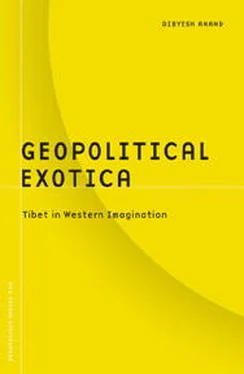Region, ed. B. Sautman and J. T. Dreyer. London: M. E. Sharpe. Muppidi, H. 2004. The Politics of the Global. Minneapolis: University of
Minnesota Press.
Neilson, B. 2000. "Inside Shangri-La/Outside Globalisation: Remapping Orientalist Visions of Tibet." Communal/Plural 8, no. 1: 95-112.
Neumann, I. B. 1999. Uses of the Other: "The East" in European Identity Formation. Manchester, England: Manchester University Press.
New York Times. 1911. "Tibet's Living Deity Interviewed at Last." 17 May. Available at http://www.nytimes.com/library/world/asia/051711tibet-special.html(accessed 20 October 2001).
Nish, I., ed. 1995. British Documents on Foreign Affairs: Reports and Papers from the Foreign Office Confidential Print, Part I, Series E (Asia, 1860-1908). Vol. 26. Washington: University Publications of America.
Norbu, D. 1990. "The Europeanization of Sino-Tibetan Relations, 1775-1907: The Genesis of Chinese 'Suzerainty' and Tibetan 'Autonomy.'" Tibet Journal 15, no. 4: 28-74.
____________________. 1997. "Tibet in Sino-India Relations: The Centrality of Marginal-
ity." Asian Survey 37, no. 11: 1078-95.
Norbu, J. 1986. Warriors of Tibet: The Story of Aten and the Khampa's Fight for the Freedom of Their Country. London: Wisdom.
____________________. 1998. "Dances with Yaks: Tibet in Film, Fiction, and Fantasy of
the West." Tibetan Review (January): 18-23.
– -. 2001. "Behind the Lost Horizon: Demystifying Tibet." In Imagining Tibet: Perceptions, Projections, and Fantasies, ed. T. Dodin and H. Rather. Boston: Wisdom.
Norbulingka Institute. 1998. Available at http://www.tibet.org/norling(accessed 4 October 2001).
Nowak, M. 1984. Tibetan Refugees: Youth and the New Generation of Meaning. New Brunswick, N.J.: Rutgers University Press.
Outside Online. 1999. "The Man Who Knocked the Bastard Off." Outside Magazine, October. Available at http://outside.away.com/outside/ magazine/1099/199910hillary1.html(accessed 20 August 2006).
Palace, W. 2005. The British Empire and Tibet, 1900-1922. London: RoutledgeCurzon.
Paolini, A. J. 1999. Navigating Modernity: Postcolonialism, Identity, and International Relations. Boulder, Colo: Lynne Rienner.
Parpart, J., and M. Zalewski, eds. 1998. The "Man" Question in International Relations. Oxford, England: Westview Press.
Parry, B. 1996. "Resistance Theory/Theorising Resistance, or Two Cheers for Nativism." In Contemporary Postcolonial Theory: A Reader, ed. P. Mongia. London: Arnold.
Parsons, G. 1997. "Another India: Imagining Escape from the Masculine Self." In At the Edge of International Relations: Postcolonialism, Gender, and Dependency, ed. P. Darby. London: Pinter.
Pattersdon, G. 1990. Requiem for Tibet. London: Aurum Press.
Peissel, M. 1972. The Secret War in Tibet. Boston: Little, Brown.
Petech, L. 1950. China and Tibet in the Early Eighteenth Century. Leiden, Netherlands: Brill.
Peterson, V. S., and A. S. Runyan. 1999. [1993]. Global Gender Issues: Dilemmas in World Politics, 2nd ed. Oxford, England: Westview Press.
Pettman, J. J. 1996. Worlding Women: A Feminist International Politics. London: Routledge.
Polo, Marco. 1958. The Travels of Marco Polo. Trans. and introduction by R. Latham. Harmondsworth, England: Penguin.
Powell, A. 1992. Heirs to Tibet: Travels among the Exiles in India. New Delhi: Bluejay Books.
Powers, J. 2000. "The Free Tibet Movement: A Selective Narrative History." In Engaged Buddhism in the West, ed. C. S. Queen. Boston: Wisdom. Available at http://jbe.gold.ac.uk77/powers001.html(accessed 20 August 2006).
Prakash, G., ed. 1995. After Colonialism: Imperial Histories and Post-colonial Displacements. Princeton, N.J.: Princeton University Press.
Pratt, A. E. 1892. To the Snows of Tibet through China. London: Longmans, Green.
Pratt, M. L. 1992. Imperial Eyes: Travel Writing and Transculturation. London: Routledge.
Prost, A. 2006. "The Problem with 'Rich Refugees': Sponsorship, Capital, and the Informal Economy of Tibetan Refugees." Modern Asian Studies 40, no. 1: 233-53.
Radhakrishnan, R. 1996. Diasporic Mediations: Between Home and Location. Minneapolis: University of Minnesota Press.
Ramakrishnan, A. K. 1999. "The Gaze of Orientalism: Reflections on Linking Postcolonialism and International Relations." International Studies 36, no. 2: 129-63.
Rampa, T. L. 1956. The Third Eye: The Autobiography of a Tibetan Lama. London: Secker and Warburg.
____________________. 1959. Doctor from Lhasa. London: Souvenir Press.
____________________. i960. The Rampa Story. London: Souvenir Press.
Rawat, I. S. 1973. Indian Explorers of the Nineteenth Century: Accounts of Explorations in the Himalayas, Tibet, Mongolia, and Central
Asia. New Delhi: Publications Division, Ministry of Information and Broadcasting.
Rhie, M., and R. Thurman. 1991. Wisdom and Compassion: The Sacred
Art of Tibet. London: Thames and Hudson. Richards, T. 1992. "Archive and Utopia." Representations 37 (Winter):
io 4-35 .
– -. 1993. The Imperial Archive: Knowledge and the Fantasy of Empire. London: Verso.
Richardson, H. E. 1962. Tibet and Its History. London: Oxford University Press.
____________________. 1988. "Tibetan Lamas in Western Eyes." Bulletin of Tibetology 1
(February): 21-33.
– -. 1998. High Peaks, Pure Earth: Collected Writings on Tibetan History and Culture. Ed. M. Aris. London: Serindia.
Riencourt, A. de. 1950. Roof of the World: Tibet, Key to Asia. New York: Rinehart.
Rijnhart, S. C. 1901. With the Tibetans in Tent and Temple: Narrative of Four Years' Residence on the Tibetan Border, and of a Journey into the Far Interior. London: Oliphant, Anderson, and Ferrier.
Rockhill, W. W. i895. Notes on the Ethnology of Tibet: Based on the Collections in the U.S. National Museum. Washington, D.C.: Government Printing Office.
Root, D. 1996. Cannibal Culture: Art, Appropriation, and the Commodi-
fication of Difference. London: Westview Press. Rose, N. H., and B. Warren. 1995. Living Tibet: The Dalai Lama in
Dharamsala. New Delhi: Paljor Publications. Rosenau, J. 1993. Global Voices: Dialogues in International Relations.
Oxford, England: Westview Press. Said, E. 1978. Orientalism: Western Conceptions of the Orient. New
York: Penguin.
____________________. 1993. Culture and Imperialism. London: Chatto and Windus.
Said, E., and C. Hitchens, eds. 1988. Blaming the Victims: Spurious Scholarship and the Palestinian Question. London: Verso.
Salter, M. B. 2002. Barbarians and Civilizations in International Relations. London: Pluto.
Samuel, G. 1982. "Tibet as a Stateless Society and Some Islamic Parallels." Journal of Asian Studies 4i, no. 2: 2i5-29.
– -. 1993. Civilized Shamans: Buddhism in Tibetan Societies. Washington: Smithsonian Institution Press.
____________________. 1994. "Tibet and the Southeast Asian Highlands: Rethinking the
Intellectual Context of Tibetan Studies." In Tibetan Studies: Proceedings of the 6th Seminar of the International Association for Tibetan
Studies, Fagernes, 1992, ed. P. Kvaerne. Oslo: Institute for Comparative Research in Human Culture.
Sandberg, G. 1904. The Exploration of Tibet: Its History and Particulars from 1623 to 1904. Calcutta: Thacker, Spink.
San Juan, E. 2000. After Postcolonialism: Remapping Philippines-United States Confrontations. Oxford: Rowman and Littlefield.
Sautman, B. 1999. "The Tibet Issue in Post-Summit Sino-American Relations." Pacific Affairs 72, no. 1: 7-21.
____________________. 2002. "Resolving the Tibet Question: Problems and Prospects."
Journal of Contemporary China 11, no. 30: 77-107.
Sautman, B., and J. T. Dreyer, eds., 2006. Contemporary Tibet: Politics, Development, and Society in a Disputed Region. London: M. E. Sharpe.
Читать дальше












